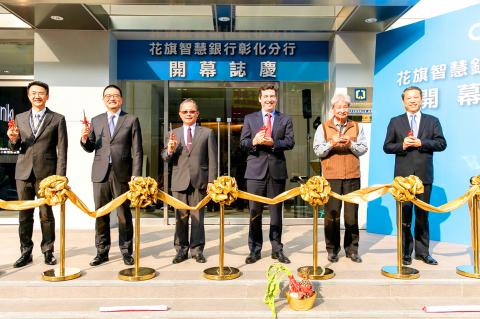Citibank Taiwan Ltd (台灣花旗) on Thursday held a grand opening ceremony for a smart banking branch in Changhua City that was upgraded from a regular one.
After building its presence in Taiwan over the past 55 years, the upgraded branch is Citibank’s latest effort to provide services and products catering to the needs of local clients after introducing its Citibank Global Wallet and premium Citi Prestige Card.
Citibank country business manager Dennis Hussey said that upgrading the Changhua branch demonstrates the bank’s commitment to furthering its investments in Taiwan and offering localized services.

Photo courtesy of Citibank Taiwan Ltd
About 80 percent of Citibank’s branches in Taiwan have been upgraded, and it will continue to renew facilities at local branches and enhance the professional skills of its staff, with an aim to create a homely environment.
As Citibank has long been dedicated to providing global and innovative services, it plans to introduce a new product, portfolio finance, in the middle of next month to help clients rejuvenate assets and to offer an agile approach to utilize capital.
The upgraded branch, which is on Xiaoyang Road adjacent to the bustling business circle of Changhua City, provides a comfortable space for clients to access real-time market information, product offerings and Web banking services.
One-on-one servicea are available at its Wealth Management Consultancy Area.
The branch has been in operation for more than 28 years, with 46 percent of its clients having used it for at least 15 years. To provide more comprehensive services, Citibank moved the branch to a new building to facilitate the upgrade. Local craftsmen from 50-year-old Cheng Li Wood Co Ltd (正利木器) were hired to give the interior a unique touch. The craftsmen created special wood patterns, signifying blessings, to adorn the windows.
With the decorative windows, Citibank aims to show the connection between the bank and local culture, and also reintroduce Lukang’s long-forgotten wooden crafts to young people, as the carpentry industry was once a source of local pride.

To many, Tatu City on the outskirts of Nairobi looks like a success. The first city entirely built by a private company to be operational in east Africa, with about 25,000 people living and working there, it accounts for about two-thirds of all foreign investment in Kenya. Its low-tax status has attracted more than 100 businesses including Heineken, coffee brand Dormans, and the biggest call-center and cold-chain transport firms in the region. However, to some local politicians, Tatu City has looked more like a target for extortion. A parade of governors have demanded land worth millions of dollars in exchange

Hong Kong authorities ramped up sales of the local dollar as the greenback’s slide threatened the foreign-exchange peg. The Hong Kong Monetary Authority (HKMA) sold a record HK$60.5 billion (US$7.8 billion) of the city’s currency, according to an alert sent on its Bloomberg page yesterday in Asia, after it tested the upper end of its trading band. That added to the HK$56.1 billion of sales versus the greenback since Friday. The rapid intervention signals efforts from the city’s authorities to limit the local currency’s moves within its HK$7.75 to HK$7.85 per US dollar trading band. Heavy sales of the local dollar by

Taiwan Semiconductor Manufacturing Co’s (TSMC, 台積電) revenue jumped 48 percent last month, underscoring how electronics firms scrambled to acquire essential components before global tariffs took effect. The main chipmaker for Apple Inc and Nvidia Corp reported monthly sales of NT$349.6 billion (US$11.6 billion). That compares with the average analysts’ estimate for a 38 percent rise in second-quarter revenue. US President Donald Trump’s trade war is prompting economists to retool GDP forecasts worldwide, casting doubt over the outlook for everything from iPhone demand to computing and datacenter construction. However, TSMC — a barometer for global tech spending given its central role in the

An Indonesian animated movie is smashing regional box office records and could be set for wider success as it prepares to open beyond the Southeast Asian archipelago’s silver screens. Jumbo — a film based on the adventures of main character, Don, a large orphaned Indonesian boy facing bullying at school — last month became the highest-grossing Southeast Asian animated film, raking in more than US$8 million. Released at the end of March to coincide with the Eid holidays after the Islamic fasting month of Ramadan, the movie has hit 8 million ticket sales, the third-highest in Indonesian cinema history, Film